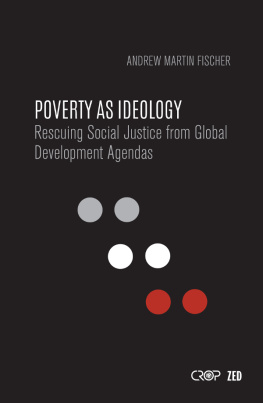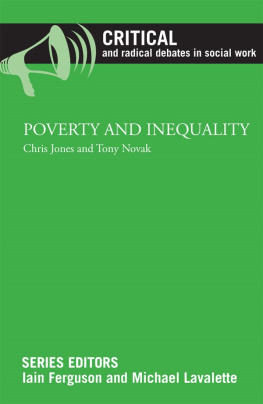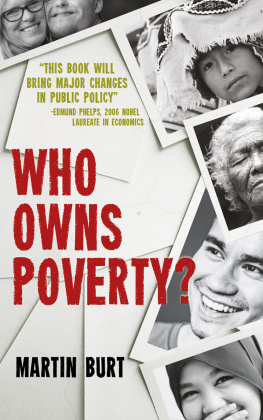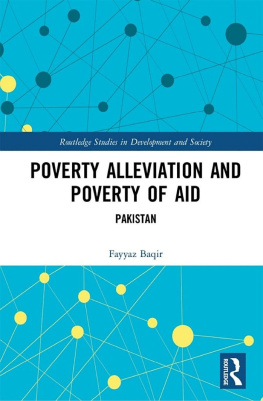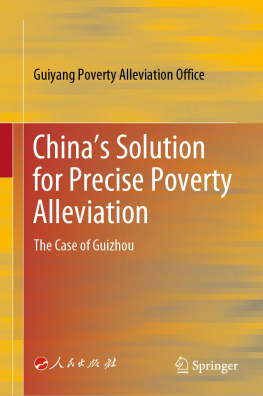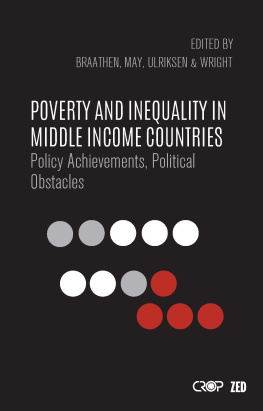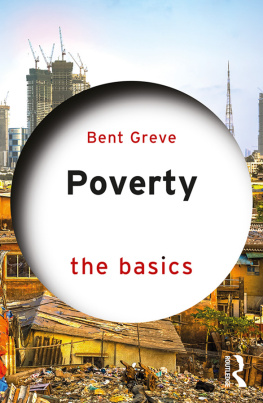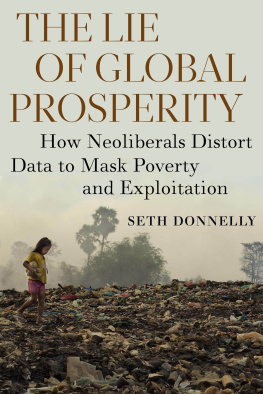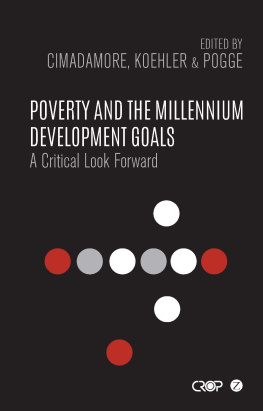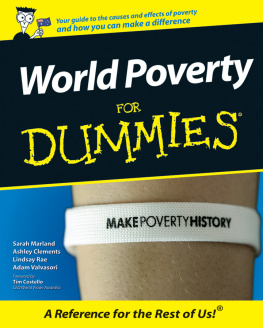
CROP INTERNATIONAL STUDIES IN POVERTY PRIZE
This book is the winner of the 2015 International Studies in Poverty Prize awarded by the Comparative Research Programme on Poverty (CROP) and Zed Books. This prize is awarded to book projects that challenge the dominant thinking and knowledge about poverty and provide sound contributions to the eradication and/or prevention of poverty in our world.
For more information, see: www.crop.org
About CROP
CROP, the Comparative Research Programme on Poverty, is a response from the academic community to the problems of poverty. The programme was initiated by the International Social Science Council in 1992, and the CROP Secretariat was officially opened in June 1993 by the Director General of UNESCO, Dr Federico Mayor.
In recent years, poverty-related issues have moved up on the international agenda, with poverty eradication now defined as the greatest global challenge facing the world today. In cooperation with its sponsors, the International Science Council (ISC) and the University of Bergen (UiB), CROP works with knowledge networks, institutions and scholars to establish independent and critical poverty research in order to help shape policies for long-term poverty prevention and eradication.
The CROP network comprises scholars engaged in poverty-related research across a variety of academic disciplines. Researchers from more than different countries are represented in the network, which is coordinated by the CROP Secretariat at the University of Bergen, Norway.
The CROP series on International Studies in Poverty Research presents expert research and essential analyses of different aspects of poverty worldwide. By promoting a fuller understanding of the nature, extent, depth, distribution, trends, causes and effects of poverty and poverty-related issues, this series will contribute to knowledge concerning the prevention and eradication of poverty at global, regional, national and local levels.
For more information, contact:
CROP Secretariat
PO Box 7800, 5020 Bergen, Norway
Phone: +47 55 58 97 44
Email:
Visiting address: Jekteviksbakken 31
www.crop.org
Series editors
Juliana Martnez Franzoni, Associate Professor of Political Science at the University of Costa Rica.
Thomas Pogge, Leitner Professor of Philosophy and International Affairs at Yale University.
CROP INTERNATIONAL STUDIES IN POVERTY RESEARCH
Published by Zed Books in association with CROP.
David Gordon and Paul Spicker (eds), The International Glossary on Poverty , 1999.
Francis Wilson, Nazneen Kanji and Einar Braathen (eds), Poverty Reduction: What Role for the State in Todays Globalized Economy? 2001.
Willem van Genugten and Camilo Perez-Bustillo (eds), The Poverty of Rights: Human Rights and the Eradication of Poverty , 2001.
Else yen et al. (eds), Best Practices in Poverty Reduction: An Analytical Framework , 2002.
Lucy Williams, Asbjrn Kjnstad and Peter Robson (eds), Law and Poverty: The Legal System and Poverty Reduction , 2003.
Elisa P. Reis and Mick Moore (eds), Elite Perceptions of Poverty and Inequality , 2005.
Robyn Eversole, John-Andrew McNeish and Alberto D. Cimadamore (eds), Indigenous Peoples and Poverty: An International Perspective , 2005.
Lucy Williams (ed.), International Poverty Law: An Emerging Discourse , 2006.
Maria Petmesidou and Christos Papatheodorou (eds), Poverty and Social Deprivation in the Mediterranean , 2006.
Paul Spicker, Sonia Alvarez Leguizamn and David Gordon (eds), Poverty: An International Glossary , 2nd edn, 2007.
Santosh Mehrotra and Enrique Delamonica, Eliminating Human Poverty: Macroeconomic and Social Policies for Equitable Growth , 2007.
David Hemson, Kassim Kulindwa, Haakon Lein and Adolfo Mascarenhas (eds), Poverty and Water: Explorations of the Reciprocal Relationship , 2008.
Ronaldo Munck, Narathius Asingwire, Honor Fagan and Consolata Kabonesa (eds), Water and Development: Good Governance after Neoliberalism , 2015.
Abraar Karan and Geeta Sodhi (eds), Protecting the Health of the Poor: Social Movements in the South , 2015.
Alberto D. Cimadamore, Gabriele Koehler and Thomas Pogge (eds), Poverty and the Millennium Development Goals: A Critical Look Forward , 2016.
Alberto D. Cimadamore, Gro Therese Lie, Maurice B. Mittelmark and Fungisai P. Gwanzura Ottemller (eds), Development and Sustainability Science: The Challenge of Social Change , 2016.
Einar Braathen, Julian May and Gemma Wright (eds), Poverty and Inequality in Middle Income Countries: Policy Achievements, Political Obstacles , 2016.
Julio Boltvinik and Susan Archer Mann, Peasant Poverty and Persistence: Theories, Debates, Realities and Policies , 2016.
ABOUT THE AUTHOR
Andrew Martin Fischer is Associate Professor of Social Policy and Development Studies at the Institute of Social Studies (ISS). He is also the founding editor of the book series of the UK and Ireland Development Studies Association, published by Oxford University Press, entitled Critical Frontiers of International Development Studies , and editor at the journal Development and Change . He won the 2015 International Studies in Poverty Prize, awarded by the Comparative Research Programme on Poverty (CROP) in 2016.
He has been involved in development studies and work in developing countries for over 30 years. This started with time spent in India and Nicaragua in the late 1980s, followed by seven years living and working with local communities in northern India and Nepal. He subsequently started his PhD at the London School of Economics (LSE) in 2002, which dealt extensively with issues of poverty, inequality and social exclusion within the context of rapid economic growth in the Tibetan areas of western China. This included two years of fieldwork in the region. His work became well-known for its critical engagement with concepts of social exclusion and marginalisation, as elaborated in his first two books: State Growth and Social Exclusion in Tibet: Challenges of Recent Economic Growth (NIAS Press, 2005), and The Disempowered Development of Tibet in China: A study in the economics of marginalisation (Lexington Books, 2014).
More generally, he has led teaching on poverty and social policy at LSE and the ISS and has worked with and/or advised various multilateral agencies and NGOs, including UNRISD, UNW, UNDP, UNICEF, UNECOSOC, Amnesty International and Human Rights Watch.
Fischers current research is focused on the role of redistribution in development at local, regional and global scales and its interaction with finance and production. Since 2015, he has been leading a European Research Council Starting Grant on the political economy of externally financing social policy in developing countries, under which he completed this book.
POVERTY AS IDEOLOGY
RESCUING SOCIAL JUSTICE FROM
GLOBAL DEVELOPMENT AGENDAS
Andrew Martin Fischer

Poverty as Ideology: Rescuing Social Justice from Global Development Agendas was first published in 2018 by Zed Books Ltd., The Foundry, 17 Oval Way, London SE11 5RR, UK.
www.zedbooks.net
Copyright CROP 2018
The right of Andrew Martin Fischer to be identified as the author of this work has been asserted by him in accordance with the Copyright, Designs and Patents Act 1988
Typeset in Plantin and Kievit by Swales & Willis Ltd, Exeter, Devon
Index by Ed Emery
Cover design by Kika Sroka-Miller
All rights reserved. No part of this publication may be reproduced, stored in a retrieval system or transmitted in any form or by any means, electronic, mechanical, photocopying or otherwise, without the prior permission of Zed Books Ltd.
Next page
